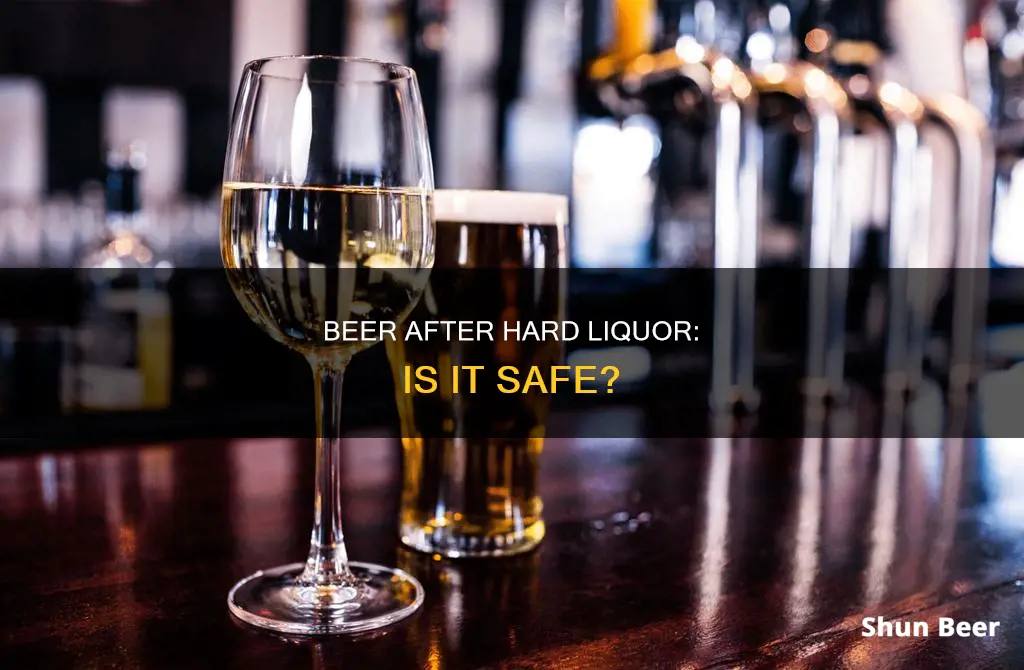
The saying beer before liquor, never been sicker; liquor before beer, you're in the clear is a well-known phrase with unknown origins. It suggests that drinking beer before liquor will result in a worse hangover, or make you sicker. However, modern research has disproven this myth. The order in which alcoholic beverages are consumed does not affect the severity of a hangover. Instead, the amount of alcohol consumed and other factors such as genetics, smoking, and drinking on an empty stomach play a more significant role in determining the intensity of a hangover.
| Characteristics | Values |
|---|---|
| Can drinking beer after liquor make you sicker? | No, it's a myth. |
| What causes sickness after drinking? | Excessive drinking, drinking on an empty stomach, not drinking enough water, smoking, genetics, etc. |
| How to prevent a hangover? | Drink in moderation, stay hydrated, eat before drinking, get enough sleep, etc. |
What You'll Learn

The order of drinks does not matter
The order in which you consume alcoholic drinks does not have a significant impact on the severity of a hangover. The popular saying, "beer before liquor, never been sicker; liquor before beer, you're in the clear," is a myth that has been widely circulated and believed by many. However, modern research has debunked this claim.
A 2019 study examined the effect of drinking beer and wine in different orders and combinations on 90 adult participants and found that the order of consumption did not influence the severity of hangover symptoms. The amount of alcohol consumed is a more critical factor in determining the intensity of a hangover.
The myth that the order of drinks matters may have originated from the way people typically progress from drinking beer to liquor during a night out. When they get sick at the end of the night or experience a hangover the next day, they tend to blame it on the last drink or the drinking order. Additionally, carbonated drinks like beer can irritate the stomach lining, increasing alcohol absorption rates, which may lead some to believe that drinking beer before liquor makes them sicker.
However, it's important to note that regardless of the order, drinking too much alcohol can have negative consequences and lead to sickness. The key to minimizing the risk of a hangover is to drink in moderation, stay hydrated, and get enough sleep.
To summarize, the order of drinks does not have a significant impact on hangover severity. The amount of alcohol consumed and other factors, such as eating before drinking, genetics, and drinking frequency, play a more significant role in determining how you feel after a night of drinking.
Beer at Wortman Park: What's the Law?
You may want to see also

Amount of alcohol consumed matters
The amount of alcohol consumed matters more than the order in which you drink beer and liquor. Drinking too much of any alcoholic beverage can lead to negative consequences such as sickness and hangovers. The severity of a hangover is influenced by the total amount of alcohol consumed, rather than the type or order of drinks.
The popular saying, "beer before liquor, never been sicker; liquor before beer, you're in the clear," suggests that drinking beer before liquor will result in a worse hangover. However, this myth has been debunked by modern research. A 2019 study found that drinking order and the type of alcohol did not affect the severity of hangover symptoms.
The amount of alcohol consumed is a more significant factor in determining the severity of a hangover. High blood alcohol levels are more likely to induce a hangover than low blood alcohol levels. The liver needs time to process the alcohol, and drinking too much or too fast can lead to a hangover as the liver cannot keep up.
Other factors that can influence hangover severity include genetics, drinking on an empty stomach, not drinking enough water, and smoking. Additionally, carbonated beverages like beer can irritate the stomach lining, increasing the rate of alcohol absorption. However, the main factor contributing to a hangover is still the total amount of alcohol consumed.
To reduce the risk of a hangover, it is important to drink in moderation, stay hydrated, and prioritize sleep. Alternating alcoholic beverages with water and adhering to recommended alcohol consumption guidelines can help minimize the negative effects of alcohol consumption.
Bock Beer: Bottoms Up or Not?
You may want to see also

Carbonated drinks irritate the stomach lining
The idea that drinking beer before liquor will make you sick is a myth. The order in which you consume alcoholic drinks does not affect the severity of a hangover. The severity of a hangover is influenced by factors such as the amount of alcohol consumed, whether you ate before drinking, how frequently you drink, genetics, congeners, and whether you smoke.
Carbonated drinks like beer and sparkling wine can irritate the stomach lining. Drinking a carbonated beverage introduces air into the stomach, similar to eating or drinking too fast. This can cause stomach pain, bloating, nausea, or a feeling of fullness. Carbonated drinks can also contain irritating additives such as sugar, caffeine, and artificial sweeteners, which can have negative health effects and irritate the digestive system.
Carbonated drinks can fill your stomach with gas, leading to bloating, nausea, or a feeling of fullness. This is due to the carbonation, or carbon dioxide, that is dissolved in the water. The gas increases gastric volume, which can be extremely distressing and lead to discomfort. It can take hours to pass the gas from carbonated water, and you will likely belch immediately after consuming it.
Some people are more sensitive to carbonated drinks than others and may experience digestive issues such as stomach pain, bloating, and gas. Carbonated drinks can also aggravate digestive conditions such as irritable bowel syndrome (IBS) and gastroesophageal reflux disease (GERD). The acidity level and carbonation of carbonated drinks may aggravate GERD symptoms.
In conclusion, while drinking beer before liquor will not make you sick, carbonated drinks like beer can irritate the stomach lining and cause digestive issues for some people. The amount of alcohol consumed is a more important factor in determining the severity of a hangover.
The Magic of Auto-Fill Beer Cups: How Do They Work?
You may want to see also

Alcohol by volume (ABV) varies
Alcohol by volume (ABV) is a metric used to determine the alcohol content in an alcoholic beverage. It is a standard measure of the volume of alcohol contained in a given volume of an alcoholic beverage, expressed as a volume percentage. The measurement shows what percentage of the beverage's total volume is pure alcohol.
ABV varies between different types of alcoholic beverages. Beer typically has a lower alcohol content than other drinks, with an ABV of between 3.5% and 7%. However, there are some outliers, with certain beers containing less than 1% ABV, and some IPAs exceeding 10% ABV. Hard cider, which is often confused with beer, is made from fermented fruit juice rather than malt, and usually has an ABV of between 4.5% and 7%.
Wine has a higher ABV than beer, with an average of around 12%. Sparkling and white wines tend to have a lower ABV of around 10%, while red wines and orange wines usually have a slightly higher alcohol content, with an ABV of around 14%. Fortified wines, which are wines with distilled grape spirits added, have the highest ABV among wines, typically ranging from 17% to 21%.
Liquor has some of the highest ABV levels among alcoholic beverages, with most liquors containing between 40% and 50% ABV. Due to their strong taste, liquors are often mixed with non-alcoholic beverages or muddled ingredients to create mixed drinks, which dilutes the alcohol content.
The ABV of an alcoholic beverage is important to know, especially when creating mixed drinks or serving alcohol to patrons in a bar or restaurant setting. Small differences in ABV can affect factors such as taste and likelihood of intoxication, so understanding ABV is key to keeping customers safe and happy.
Should You Drink That Beer Left Out Overnight?
You may want to see also

Drinking on an empty stomach
- Difficulty remaining conscious
- Inability to wake up
- Slow breathing (roughly eight or fewer breaths per minute)
- Irregular breathing (at least 10 seconds between breaths)
- Low body temperature
- Bluish skin colour or paleness
If you are with someone who may have alcohol poisoning, call emergency services right away.
To avoid the dangers of drinking on an empty stomach, it is recommended that you eat at least an hour before drinking, and not drink more than one standard drink per hour. Choosing a lower-alcohol beverage, diluting it with water or other non-alcoholic liquids, and drinking water at the same time are also ways to reduce the concentration of alcohol in your drink.
Hypoglycemia and Beer: Is It Safe to Drink?
You may want to see also
Frequently asked questions
Yes, you can drink beer after liquor. The order in which you consume your drinks is unlikely to influence whether you experience a hangover the next day.
There are many theories about how this saying originated. One is that most people start with drinks that have a lower alcohol content, like beer, and move on to liquor as the night goes on. If they get sick at the end of the night or feel unwell the next day, they may blame it on the order in which they drank. Another theory is that liquor's high alcohol content is more likely to spike your blood alcohol levels quickly compared to beer.
The only way to completely prevent a hangover is to not drink alcohol or to drink in moderation. Staying hydrated, eating while drinking, and getting enough sleep can also help prevent a hangover.







